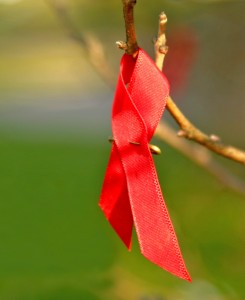World AIDS Day is Dec. 1.
Vickie Lynn, a USF College of Public Health doctoral student living with HIV, has joined a national campaign discussing intimate partner violence and HIV.
“Although it took me a very long time, I can talk about it now,” Lynn said. “There are many women in relationships who are experiencing intimate partner violence, and they don’t see a way out.”
Greater Than AIDS, a national community group focused on educating the public about HIV/AIDS, launched the new campaign, Empowered: Women, HIV and Intimate Partner Violence, to highlight the stories of women living with HIV who survived abuse and moved forward.
According to the Centers for Disease Control and Prevention, women who experienced intimate partner violence, including both physical and emotional abuse, have an increased risk of HIV infection.
“In the general population one in three women experiences intimate partner violence; for women living with HIV, its one in two women,” Lynn said.
In the late 1980s, Lynn was 18 years old and living in Tampa when she met the man she thought she would marry. However, he turned out to be both physically and emotionally abusive.
Her breaking point was the day he beat her with a billy club, covering her head to toe in blood. She left that day and never looked back.
A few years later, she received news that would change her life. She found out that she was living with HIV and had contracted it from her former, abusive partner.
“When they told me I was living with HIV, they also told me that I had three years to live,” Lynn said. “Emotionally, I wasn’t dealing with it very well. Friends stopped calling me, my mother wouldn’t hug me anymore; she washed everything I touched with bleach. The stigma from the very get-go was very difficult. I started doing a lot of drinking and I decided if I was going to die, I was going to go out with a bang.”
Lynn said she was severely depressed and started hanging with the wrong crowd, abusing alcohol and drugs. Her health deteriorated and within a few years it had progressed to an AIDS diagnosis.
“I ended up losing my job, my health insurance, my place to live, my hope and sleeping under a street bridge,” she said. “I literally had a nervous breakdown.”
Weighing barely 85 pounds, with less than 50 T-cells, numerous opportunistic infections and no access to health care, Lynn said she felt the end was close.
It wasn’t until an AIDS Service organization stepped in and offered her housing that her outlook began to change.
In the mid-1990s, after regaining access to health care, she started taking new antiretroviral medications and, according to Lynn, found hope for the future.
“I started feeling human again and I don’t know where I got the inspiration from, but I thought ‘If I had a second chance at life what would I do?’ and I had always wanted to go to college and that’s what I did,” Lynn said.
She worked to obtain her associate’s degree from Hillsborough Community College, then her bachelor’s degree and two master’s degrees, both at USF, one from the College of Public Health and the other from the School of Social Work.
She is currently a fourth-year doctoral student in the Department of Family and Community Health at the COPH. Her research interests involve exploring system and organizational level factors affecting the delivery of integrated health care services for people living with HIV.
Lynn, who has been living with HIV for the past 30 years, said she wanted to be part of the Empowered campaign to give hope to other women who may be in a similar situation.
“I want to educate other women and let them know that even if you have experienced trauma or abuse or if you’re living with HIV you can still have a productive, wonderful life” she said. “I want to be the voice for women who don’t have a voice or can’t find their voice.”
She hopes to continue working in Florida at the institutional level to help bridge the gap between research and practice with a focus on integrated health care services for people living with HIV.
“We want to reduce the transmission of HIV, but we’re not doing a great job of increasing access to care or maintaining people in care and treatment, and that’s troublesome,” Lynn said. “This is why integrated care is so important. Holistically addressing the physical health, mental health and social service needs of people living with HIV can improve retention in care, improve health outcomes and increase quality of life, while controlling costs and reducing transmission.”
Lynn said HIV is the reason she is where she is today.
“This is the reason I’m passionate about public health. This is the reason I’m passionate about mental health and changing the public health care system,” she said. “HIV does not discriminate. It doesn’t matter who you are, how much money you make, what race you are, or your sexual identity.”
As World AIDS Day commemorates on Dec. 1, Lynn is reminded of the hundreds of friends she has lost to the virus and why she is so passionate about working to address the issues she’s become so familiar with.
“World AIDS Day, for me, is just being grateful for all the people who have worked hard to allow those of us living with HIV to have a life worth living,” she said. “God allowed me to live for a reason, I don’t know what that is yet. But, every day I just try to do the best I can, and if I touch someone’s life in a positive way, that’s great.”
For more about the campaign, visit: empowered.greaterthan.org. To watch the videos related to the campaign, visit: youtube.com/greaterthanaids.


